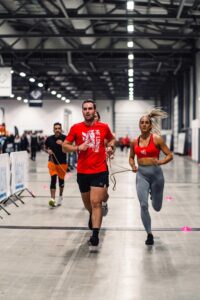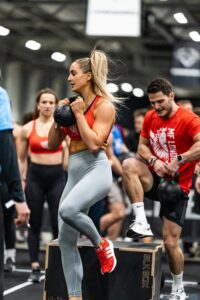Sports Performance – Competition Day Prep
Whatever category your competition falls in, if you want to perform and get the most out of your body. Preparation is key.
Many people think if they aren’t an elite athlete then nutrition and general preparation prior to these comp days might be excessive. But if you’re exercising more than 5-6 hours a week at a high intensity or high volume and competing, you need to be thinking about sports nutrition. You are doing your body a disservice if you’re not.
Or on the contrary, you might have an unsettling level of competitiveness (like myself) and want to incorporate all those 1% to get that podium position.
Whichever class you reside in, this article is for you.
I recently competed in the London Winter Turf Games, a global functional fitness competition which my team and I placed 1stposition.
There was a lot of hard work and training that went into this, I put myself on a sports nutrition and performance plan 6 weeks leading up to the comp. Going into detail on that might put you to sleep. So instead, I’ve summarised the key points to competition day prep below.

PROTEIN
Protein for an active person, depending on their goals should be anywhere between 1.6-2.2g per kg of body weight.
E.g., A 70kg individual with a 1.8g per kilo requirement would need 126g of protein a day.
This can seem like a lot, and granted.
It is.
Reaching protein targets is hard.
Leading up to a comp, I’ve been known to be sitting in the kitchen forcing down a Kvarg protein tub, giving myself a pep talk between each mouthful.
But protein is vital for muscle growth, recovery and performance. Without it, you’re not going to reach your goals.
Because protein is required for so many functions throughout the body, if your body doesn’t get enough, it will start to break down muscle tissue. This can cause issues for performance, muscle building, recovery and body composition. Which when it comes to performance, this can be detrimental.
Worry less about getting a protein shake in after gym, and more about reaching your targets in adequate feedings throughout the day.
CARBOHYDRATES
I love carbs, please don’t be scared of carbs. They love you too.
They’re your power bank when it comes to performance. It’s your brains number 1 energy source and the body prefer carbs as a fuel and will use them readily during sport.
You know those sessions where your legs feel like they can’t move and you’re ready to collapse by the halfway mark?
Yeah. Carbs can help there.
For the carb-phobia inclined person, I recommend having a small carb hit before training. Just 2 dates or half a banana beforehand can get you through that energy crash. Better performance equals better results.
On the day of the comp, getting in a slightly higher carb meal 2 hours prior is ideal. My go-to is porridge or oats for the morning. Or a veggie fried rice dish can be a good lunch option.
SUPPLEMENTS

MAGNESIUM
AKA a miracle worker.
Fundamental for muscle recovery, energy production, sleep and stress adaptation. It does so much, but in terms of sport, exercise depletes magnesium and a deficiency can impair performance. Because it’s also great for sleep it can help in much needed recovery.
CARNITINE
L-Carnitine has the ability to improve endurance capacity and reduce lactic acid build up (you know that delightful burning, legs like lead feeling). By increasing your endurance capacity, this directly translates to better sprint performance and time to exhaustion.
We love that.
TART CHERRY
Shows significant improvement in endurance performance. Furthermore, it aids in muscle recovery by helping to ‘clean up’ muscle damage caused by exercise related inflammation.
Taken in concentrate form after exercise, that way it can also double up as a carb source for energy replenishment.
CREATINE
The main fuel source for our high energy system used in explosive efforts. By providing your body with this fuel in those max effort workouts, it allows us to potentially perform better, get more sets out and subsequently develop strength and muscle growth from this.
REST
Recovery is a part of training. Arguably, one of the most important parts.
You could be doing all the right things but without adequate rest incorporated into your schedule, you might never reach the goals you want to.
In super simple terms, if you’re not resting, your muscles aren’t recovering. if your muscles aren’t recovering, you will not be able to perform at your peak.
Aim for 1-2 rest or recovery days a week, due to my training volume, I have 1 rest day and 1 active recovery day.
And enjoy your rest days! Because if you were drawn to read this article, then you’ve no doubt earned it.
But as with everything, these changes need to happen gradually. Making drastic changes in a day will not mean you wake up as Lebron James. You need to find your bodies best macro ratios, what sources it prefers, what timing it prefers.
Make small changes over time.
Give your body the time to adapt to changes and it will reward you.
Lastly, don’t go changing up your routine the day of a competition. Especially the week leading up. Have a plan and stick to it. The body prefers routine so have your meals, training and rest days planned. Then all you have to do is follow it.
This is really the bones of competition preparation. If you want to know more or have a plan created specifically for you, then you can book in for a sport’s nutritional assessment with myself! We can work together to create your ideal plan utilising the best of naturopathic, herbal and nutritional supplementation to see you read your podium, while also recovering well and preventing/managing injuries.
Book in a consult with Naturopath Ali here, or call the clinic on 03 5977 0117.
This article is intended to be informational only and represents the opinion of the author. It is not intended to be used as medical advice and does not take the place of advice from a qualified health care practitioner in a clinical setting. Please check with your healthcare practitioner before embarking upon any of the treatments discussed.

